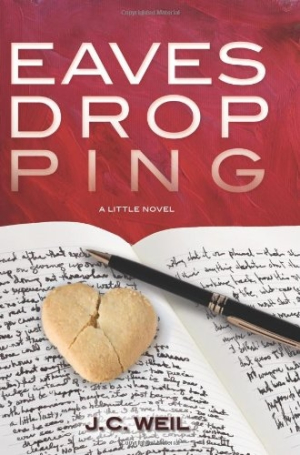
Eavesdropping
A Little Novel
Real characters highlight this challenging story of head-spinning dysfunction.
There are times when talking is highly overrated. In Eavesdropping, J. C. Weil creates a character who tires of all the inane chatter in the world, including her own, and decides to experiment. She becomes mute. A short novel, wry and brooding in wit and punctuated with dizzying forays into randomness, Eavesdropping shows a side of the human mind that is uniquely individual and perhaps speaks to the need for therapy.
Desirée Bindell’s unique outlook on life, herself, and the people around her has forever been a part of her makeup, and those closest to her take it in stride. A woman with an extreme imagination, she is willing to try anything that strikes her fancy. She doesn’t stop in a normal, timely manner, but has a tendency to take things a bit too far, as is the case with her latest quest—to be mute.
Desirée’s live-in boyfriend, Harry, who is normally supportive, thinking her quirky ideas are adorable, has not been able to accept her latest experiment with open arms. In fact, his ability to deal with it, as he’d done in other instances, is failing him now. After all, their relationship is based on talking. He’s a lawyer, and she’s an ex-speech therapist, and they met talking. Like most people, it’s how they communicate. Yet he has no choice but to deal with Desirée’s silence. They communicate using Post-it notes. But when Harry finds Desirée’s journal, things quickly shift from bad to worse.
Weil’s characters speak directly to the reader, giving the sense they are real. A reader may either nod her head or shake it every time Desirée creates a new nickname for someone: Mr. Permanent Leisure, an overly tanned man who must have too much time on his hands; Treadmark, a man in a wheelchair; and Side Meat for Harry. Or when she produces yet another set of initials to keep from wasting her breath—P. L. for Permanent Leisure or NEMM for Not Excellent Mate Material, which she guesses she may be. Then one may wonder if what Harry is doing is ethical—reading Desirée’s journal.
J. C. Weil’s Eavesdropping is a challenging story that will have the reader either chuckling and eagerly flipping the pages for more, or feeling confused by the dysfunction and constant “eavesdropping” of it all. This novel moves along with a crisp, sometimes choppy plot and dialogue and with writing that comes across as though it were written for a stage performance. It manages to finish off with a respectful answer to why she stopped speaking and what she found.
Eavesdropping may be best appreciated by those of a quirky nature—whose imaginations will stop at nothing to experience and experiment with life—and by those patient enough to stand by their side.
Reviewed by
Tammy Snyder
Disclosure: This article is not an endorsement, but a review. The publisher of this book provided free copies of the book and paid a small fee to have their book reviewed by a professional reviewer. Foreword Reviews and Clarion Reviews make no guarantee that the publisher will receive a positive review. Foreword Magazine, Inc. is disclosing this in accordance with the Federal Trade Commission’s 16 CFR, Part 255.
